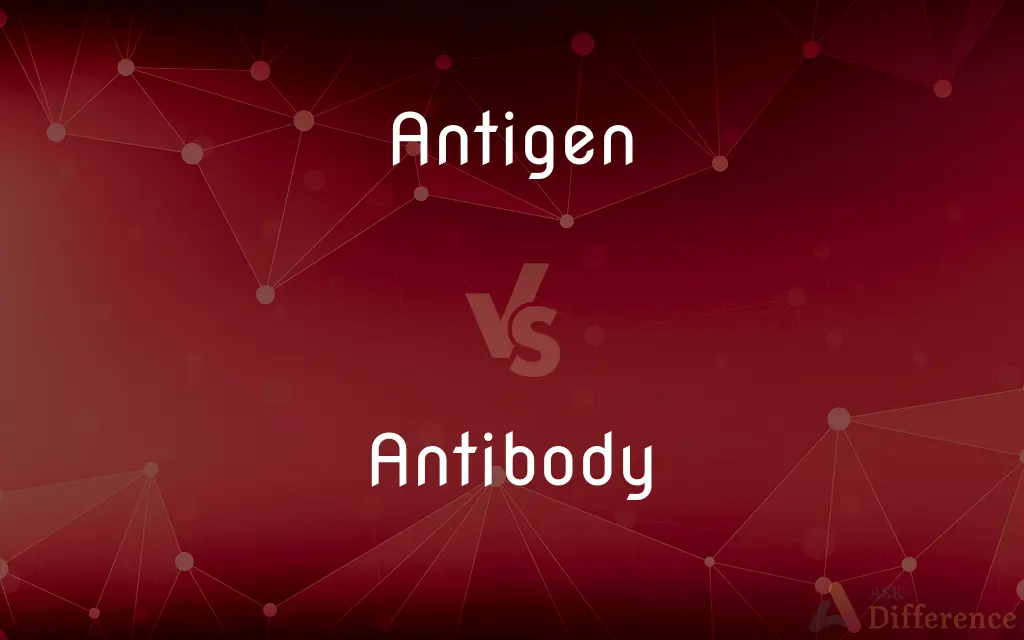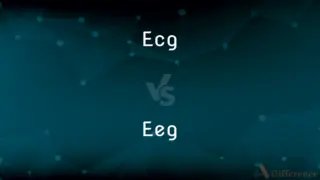Antigen vs. Antibody — What's the Difference?
Edited by Tayyaba Rehman — By Fiza Rafique — Updated on November 1, 2023
Antigens are foreign substances that induce an immune response; antibodies are proteins produced by the immune system to neutralize antigens.

Difference Between Antigen and Antibody
Table of Contents
ADVERTISEMENT
Key Differences
Antigens are substances or molecules that, when introduced into the body, are recognized as foreign by the immune system, which then may trigger an immune response. Antibodies are specific proteins produced by the immune system in response to antigens; they bind to antigens to help eliminate them.
While antigens can be proteins, polysaccharides, lipids, or nucleic acids, antibodies are always Y-shaped proteins called immunoglobulins. Antigens are the target of the immune response; antibodies are the defenders produced by B lymphocytes to neutralize or mark antigens for destruction.
Antigens are often found on the surfaces of pathogens, such as viruses or bacteria, prompting an immune reaction. Conversely, antibodies circulate in the bloodstream and are crucial components of the humoral immune response.
The specificity of an antibody is determined by its variable region, which is unique and binds to a particular antigen. On the other hand, an antigen's immunogenicity is defined by its epitopes—the part of the antigen recognized by antibodies.
Comparison Chart
Nature
Substance that triggers immune response
Protein that reacts to an antigen
ADVERTISEMENT
Origin
Can be from external source or part of host (autoantigens)
Produced by the host’s immune system
Role
Induces production of antibodies
Neutralizes antigens and aids in their removal
Structure
Varied structures (proteins, polysaccharides, etc.)
Y-shaped proteins with specific antigen-binding sites
Types
Pathogen-associated, allergens, autoantigens
IgG, IgM, IgA, IgE, and IgD (immunoglobulin classes)
Compare with Definitions
Antigen
Identified by specific antibodies.
Each antigen has a unique shape that antibodies can recognize.
Antibody
Binds specifically to an antigen.
The antibody latched onto the antigen, marking it for destruction.
Antigen
Often part of an invading pathogen.
Bacterial cell wall components act as antigens.
Antibody
A blood protein produced in response to an antigen.
Her body made antibodies against the chickenpox virus.
Antigen
Can be a toxin or other foreign substance.
The antigen in the bee sting causes an allergic reaction.
Antibody
Diverse with many specificities.
Millions of different antibodies exist, each with a unique antigen target.
Antigen
A molecule that triggers an immune response.
The flu virus has multiple antigens on its surface.
Antibody
Can neutralize pathogens.
Antibodies can neutralize toxins released by bacteria.
Antigen
May cause allergies.
Pollen antigens are responsible for seasonal allergies.
Antibody
Formed by B cells of the immune system.
After vaccination, B cells produce antibodies to protect against infection.
Antigen
In immunology, an antigen (Ag) is a molecule or molecular structure, such as may be present on the outside of a pathogen, that can be bound by an antigen-specific antibody or B-cell antigen receptor. The presence of antigens in the body normally triggers an immune response.
Antibody
An antibody (Ab), also known as an immunoglobulin (Ig), is a large, Y-shaped protein used by the immune system to identify and neutralize foreign objects such as pathogenic bacteria and viruses. The antibody recognizes a unique molecule of the pathogen, called an antigen.
Antigen
A toxin or other foreign substance which induces an immune response in the body, especially the production of antibodies.
Antibody
A blood protein produced in response to and counteracting a specific antigen. Antibodies combine chemically with substances which the body recognizes as alien, such as bacteria, viruses, and foreign substances in the blood.
Antigen
A molecule that is capable of binding to an antibody or to an antigen receptor on a T cell, especially one that induces an immune response. An antigen is usually a foreign substance, such as a toxin or a component of a virus, bacterium, or parasite.
Antibody
Any of numerous Y-shaped glycoproteins that bind to specific antigens and either neutralize them or cause them to be destroyed by other elements of the immune system, such as phagocytes, cytotoxic cells, or complement proteins. Antibodies occur as antigen receptors on the surface of B cells and are secreted as soluble proteins when the B cells mature into plasma cells. Antibodies are also called "immunoglobulins."
Antigen
(immunology) A substance that induces an immune response, usually foreign.
Antibody
(immunology) A protein produced by B-lymphocytes that binds to a specific antigen.
Antigen
Any substance (as a toxin or enzyme) that stimulates the production of antibodies
Antibody
Any of various bodies or substances in the blood which act in antagonism to harmful foreign bodies, as toxins or the bacteria producing the toxins. Normal blood serum apparently contains various antibodies, and the introduction of toxins or of foreign cells also stimulates production of their specific antibodies by the immune system.
Antibody
More narrowly, any of the immunoglobulins present in the blood serum or other body fluids of an animal, which reacts with a specific antigenic substance, whether the antibody was produced as a consequence of the stimulus provided by the antigen, or was pre-existing prior to exposure of the organism to the antigen.
Antibody
Any of a large variety of proteins normally present in the body or produced in response to an antigen which it neutralizes, thus producing an immune response
Common Curiosities
Are all antigens harmful?
No, not all antigens cause disease; some are benign and do not elicit a strong immune response.
Can antibodies be artificially produced?
Yes, antibodies can be produced through biotechnological methods for use in therapy and research.
What is an antigen?
An antigen is any substance that elicits an immune response, especially the production of antibodies.
How do vaccines work with antigens and antibodies?
Vaccines introduce an antigen to stimulate antibody production without causing disease, providing immunity.
Can the same antibody bind to different antigens?
Typically, an antibody binds to a specific antigen, but some antibodies can bind to similar epitopes on different antigens.
Can antigens mutate?
Yes, antigens, especially on viruses, can mutate, sometimes evading the immune response.
What is an antibody?
An antibody is a protein produced by the immune system that binds to a specific antigen to help counteract it.
Do antigens only come from pathogens?
No, antigens may also come from non-pathogenic sources like foods or the body’s own cells.
What's the difference between an antigen test and an antibody test?
An antigen test looks for the presence of the pathogen itself, while an antibody test looks for the immune response to the pathogen.
What are monoclonal antibodies?
Monoclonal antibodies are lab-created antibodies that bind to specific antigens for therapeutic uses.
What are autoantigens?
Autoantigens are the body’s own proteins that can sometimes be mistakenly targeted by the immune system.
Can antibodies cause harm?
In autoimmune diseases, antibodies can mistakenly target and damage the body's own tissues.
Can antigens be used in blood tests?
Yes, antigens are often targeted in diagnostic tests to identify infections or diseases.
Are antibodies found in all body fluids?
Antibodies are primarily in the blood, but they can also be in other fluids like saliva and breast milk.
Can someone be immune without antibodies?
Typically, antibodies are crucial for immunity, but other aspects of the immune system also contribute to a robust immune response.
Share Your Discovery

Previous Comparison
ECG vs. EEG
Next Comparison
Attitude vs. CharacterAuthor Spotlight
Written by
Fiza RafiqueFiza Rafique is a skilled content writer at AskDifference.com, where she meticulously refines and enhances written pieces. Drawing from her vast editorial expertise, Fiza ensures clarity, accuracy, and precision in every article. Passionate about language, she continually seeks to elevate the quality of content for readers worldwide.
Edited by
Tayyaba RehmanTayyaba Rehman is a distinguished writer, currently serving as a primary contributor to askdifference.com. As a researcher in semantics and etymology, Tayyaba's passion for the complexity of languages and their distinctions has found a perfect home on the platform. Tayyaba delves into the intricacies of language, distinguishing between commonly confused words and phrases, thereby providing clarity for readers worldwide.
















































